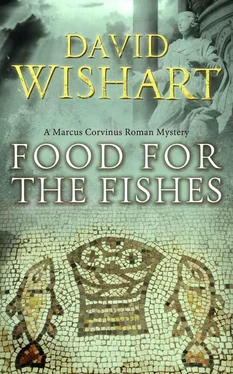David Wishart - Food for the Fishes
Здесь есть возможность читать онлайн «David Wishart - Food for the Fishes» весь текст электронной книги совершенно бесплатно (целиком полную версию без сокращений). В некоторых случаях можно слушать аудио, скачать через торрент в формате fb2 и присутствует краткое содержание. Год выпуска: 2015, Жанр: Исторический детектив, на английском языке. Описание произведения, (предисловие) а так же отзывы посетителей доступны на портале библиотеки ЛибКат.
- Название:Food for the Fishes
- Автор:
- Жанр:
- Год:2015
- ISBN:нет данных
- Рейтинг книги:4 / 5. Голосов: 1
-
Избранное:Добавить в избранное
- Отзывы:
-
Ваша оценка:
- 80
- 1
- 2
- 3
- 4
- 5
Food for the Fishes: краткое содержание, описание и аннотация
Предлагаем к чтению аннотацию, описание, краткое содержание или предисловие (зависит от того, что написал сам автор книги «Food for the Fishes»). Если вы не нашли необходимую информацию о книге — напишите в комментариях, мы постараемся отыскать её.
Food for the Fishes — читать онлайн бесплатно полную книгу (весь текст) целиком
Ниже представлен текст книги, разбитый по страницам. Система сохранения места последней прочитанной страницы, позволяет с удобством читать онлайн бесплатно книгу «Food for the Fishes», без необходимости каждый раз заново искать на чём Вы остановились. Поставьте закладку, и сможете в любой момент перейти на страницу, на которой закончили чтение.
Интервал:
Закладка:
I sat up.
‘Go on, lady,’ I said quietly.
‘I don’t think I can. There isn’t anything more, really, just that. But it has been puzzling me, and it is curious, isn’t it? I mean, when you consider that so much of this business has come back to names. Murena, dead in a tank of moray eels. Ligurius, the manager, with the nickname Anchovy. Tattius, Oistrus. And didn’t you say that the old man had given the rest of his family nicknames too?’
The itch was there in spades, and I was getting that slow, cold feeling spreading through me that was my subconscious’s way of telling me something was important, somewhere. Oh, shit! So he had! Gellia was the Butterfly, Nerva the Scoundrel and Chlorus the Scowler. So why not Penelope? Just because it was a harmless, everyday girl’s pet-name didn’t mean -
Hang on, Corvinus! Think! Saenius, when he’d talked about her, had called her Licinia. So had Philippus, who’d known her when he was Murena’s door-slave. Both Philippus and Saenius were talking about the girl as a teenager, before or immediately after her mother’s death and the trial. Why hadn’t they called her Penelope? Girls got their pet-names when they were kids, not on the verge of adulthood. Look at Catia’s Hebe. She was really Licinilla — which she’d have to be, being Chlorus’s daughter, that or Licinia again — but Catia had said that that had been too much of a mouthful, so they hadn’t used it right from the start.
Giving pet-names didn’t always happen. That was just the point. It hadn’t, as far as I could see, happened where our Licinia was concerned until she was well into her teens…
So why had teenage Licinia, settled with her name, suddenly become Penelope?
The hook caught me right in the gut, along with the answer.
‘Because it wasn’t a pet-name at all,’ I said. ‘It was a nickname, like all the rest of them. A fucking nickname!’
‘Marcus!’
I ignored her. It made sense; Jupiter Best and Greatest, did it make sense! ‘Murena gave it to her,’ I said. ‘After she was betrothed to Tattius. And he used it — the rest of the family used it — ever after. They still do.’
Perilla was looking puzzled. ‘But Penelope uses it herself, dear,’ she said. ‘If it was a nickname and she hated her father, then surely if he gave her it then — ’
‘Penelope used it because it fitted, and she didn’t mind. Quite the reverse, she was proud of it. In fact, she preferred it to Licinia, because Licinia connected her with her father.’
‘But why did Murena give her it in the first place? Surely calling a girl Penelope is a compliment, if anything.’
I shook my head. ‘Not the way he meant it. It couldn’t’ve been, ipso facto, because none of the bastard’s other nicknames were complimentary. There was always something nasty about them, and my guess is that Murena was about as fond of his daughter as she was of him. He nicknamed her Penelope as a sneer because she was faithful and patient. Twenty-eight years patient, as it turned out. And she didn’t give in to the suitors, not really, not in herself. She still hasn’t.’ Gods! I’d been an idiot! A total, purblind fucking moron! She’d told me! She’d told me herself, the very first time I’d interviewed her, right down to using the guy’s actual name, even if she had lied about the rest of it…
The silly, silly man. Right. I’d go with her on that one all down the line. That made two of us.
‘Marcus?’ Perilla was staring at me anxiously. ‘Marcus, what is it?’
‘I know who committed the murders,’ I said. ‘All three. And why.’
She asked me the obvious question. So I told her.
27
I didn’t go round to the Tattius villa next morning until well after breakfast. There was no point in hurrying now. Besides, to yank the lady out of bed for what amounted to an official confrontation would’ve been unnecessary and cruel, and I felt bad enough already about how this business was ending to risk that. Why the hell couldn’t the killer have been Nerva? Him I could’ve handed over to the praetor’s rep without a qualm, and society could’ve done without the bugger, easy.
Instead I got this.
The door-slave passed me on to Stentor, who took me through to Penelope’s sitting-room. She was there already, in her mourning mantle, and she looked up as I came in. There must’ve been something about my face that told her why I’d come, because when our eyes met I saw her flinch and then sort of settle into herself, like a boxer who’s taken a hard punch shakes his head to clear it and squares up again for the rest of the match.
‘Stentor,’ she said quietly. ‘That message I asked you to deliver. Do it now, please.’
‘Yes, madam.’ He bowed and went out.
I watched him go. Yeah, he’d told me he was the mistress’s slave, not the master’s. And I knew now who the friend had been who’d given him to her as a wedding present. I considered my options. I could stop him, sure, but it wouldn’t matter in the end, however it panned out, and I hadn’t cared much for any of them. Either from personal acquaintance or, in the first one’s case, by repute. Leave it.
I turned back. Penelope hadn’t moved. She was sitting still as marble. I nodded, slightly, and it seemed that some of the stiffness went out of her.
‘Valerius Corvinus,’ she said. ‘What brings you here?’
‘Ligurius,’ I said.
She’d been well prepared for it. This time, she didn’t even blink. ‘Come in,’ she said. ‘Have a seat.’
I sat down on the chair facing. The window-doors were open again and there was the hint of a breeze blowing in from the garden.
‘He was the Quintus you mentioned,’ I said. ‘The one who you were promised to originally. Only he wasn’t a cousin, and he didn’t die of fever.’
‘Yes,’ she said quietly. She looked down at her hand, at the plain brass ring on her engagement finger, the only one she wore. ‘How did you find out?’
‘Your name. Penelope. Ulysses’s wife.’
She nodded. ‘Ah. So simple.’
‘Your father gave it to you, didn’t he? As a nickname, when you were betrothed to your husband?’
‘Yes.’ She was quite composed. ‘I told him I’d do what he wanted, marry Decimus, but that I’d always regard myself as engaged to Quintus.’
‘What did he say?’
‘He laughed. Said I could please myself who I thought I was engaged to, as long as the marriage went ahead. Then he said he was minded to call me Penelope in future. The faithful Penelope. I told him I didn’t care, that I’d welcome it, in fact. He didn’t like that.’
‘The original engagement. It was official?’
‘Yes. Of long standing, although not a well-publicised one. Gaius and I had been brought up together as children. Gaius’s father was the manager of the farm before him, and his grandfather before that. Not slaves, never slaves, and by that time they were almost family. We’d loved each other for years. It wouldn’t’ve mattered to Father if we’d married: he had two sons already, and an engagement to someone of Gaius’s class would save him an expensive dowry. That was the way he thought.’
‘And Gaius — Ligurius — accepted the situation?’
She smiled. ‘He had no choice. I told you, when we talked before. He was an employee, I was the master’s daughter. Running away together would’ve been pointless, and at least we’d still see each other.’
‘You didn’t…continue the relationship?’
‘No,’ she said simply. ‘Not in the way you mean it. That wouldn’t have been right. But Gaius never married. We saw each other, secretly, from time to time — we still do, of course — though never in compromising circumstances. And Gaius gave me Stentor, so we could keep in touch that way as well. He cost him nearly a year’s wages.’
Читать дальшеИнтервал:
Закладка:
Похожие книги на «Food for the Fishes»
Представляем Вашему вниманию похожие книги на «Food for the Fishes» списком для выбора. Мы отобрали схожую по названию и смыслу литературу в надежде предоставить читателям больше вариантов отыскать новые, интересные, ещё непрочитанные произведения.
Обсуждение, отзывы о книге «Food for the Fishes» и просто собственные мнения читателей. Оставьте ваши комментарии, напишите, что Вы думаете о произведении, его смысле или главных героях. Укажите что конкретно понравилось, а что нет, и почему Вы так считаете.












